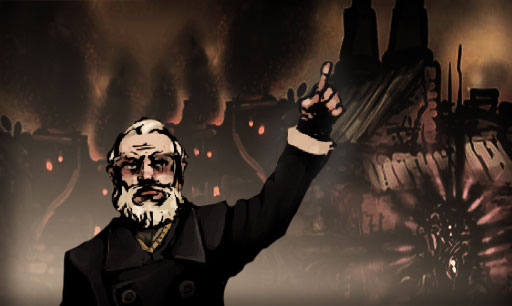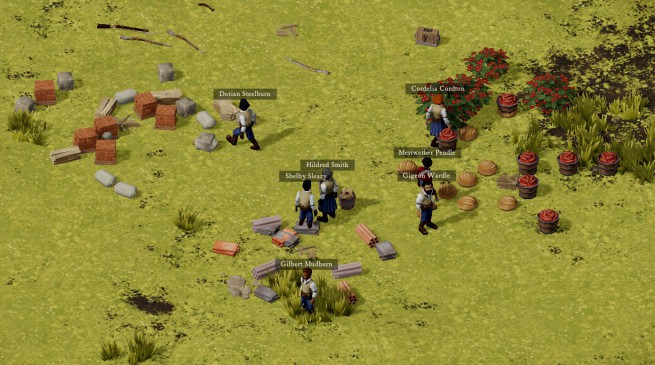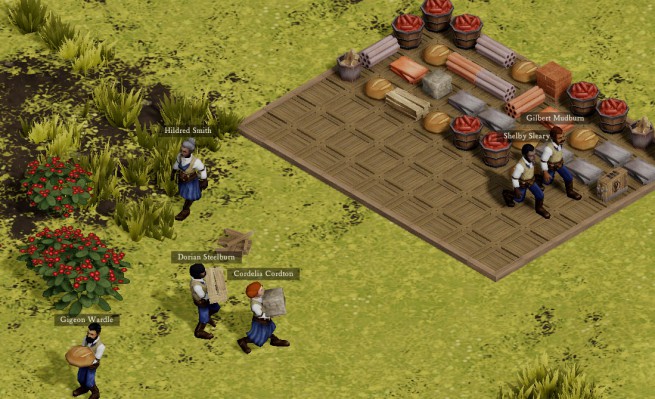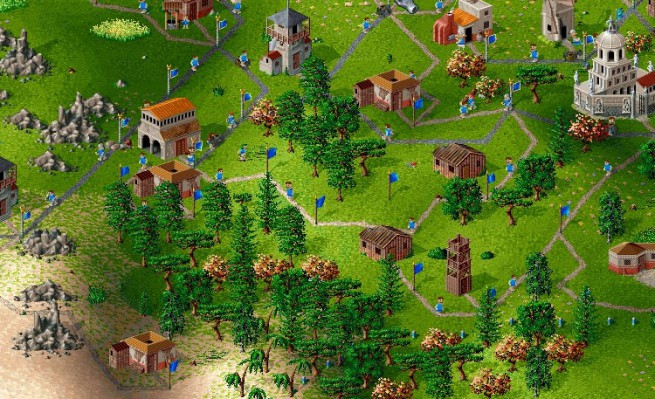We’re running two game design experiments on our internal build, both of which are going to fundamentally change the balance of the game if we stick to them, and it might be interesting for you to know why! Or turn back now and forever revel in blissful ignorance.
Experiment 1: The Seven Dwarves
Many of the start new game parameters are holdovers from when we needed to test things in the game quickly and easily, and we’re starting to re-examine what we give the player upon game-start with regard to what’s in their best interest. Usually we have been tending to reducing the resources the player has available at the start because we want to stress the importance of interaction with the environment. We toned down the number of logs given at the start as an initial test so that interaction with the environment is required to build anything and thus deal with an increased decision space. But we’re still dropping new players into a realm of “too much choice”. Starting resources can be allocated poorly, and players often designate dozens of jobs then get frustrated that they’re not all executed in the order or at the speed that they’d expect.
The Seven Dwarves experiment is a stark reduction in starting colonists so that player begins with just seven middle-class characters. This is designed to do a few things: It makes the choices on how the player must allocate resources in the early game have very clear results. You have seven characters, and if you give them more than seven jobs, they won’t be able do all of them. This was always the case of course (you could only do as many jobs at once as you had work crews) but new players unfamiliar with the work crew system would wonder why some characters were idling if, say, you had more people in a work crew than jobs that the work crew could do.
There are two issues with the reduced start. The first, which we can fix with a few other changes, is a simple matter of balancing. We need to make sure that seven characters working in optimal circumstances can make enough “stuff” (especially edible food-stuff) to ramp up your settlement. The second is that there’s less “interesting background noise” going on in a game where you have only seven characters working their asses off. There will be fewer conversation between the characters, strange occurrences, et cetera. We can balance this out by ensuring that there are different viable decision paths available in a timely matter, and that each has interesting outcome, via events or effects on the characters.
Spending the time to add new content to fill out the game start and re-balance is necessarily an iterative process. We need to see how it plays (maybe we should have six or eight people?). We’ll be doing our best to make sure that the super early game is still interesting for people that have a lot of experience with the game though, so don’t worry!
Experiment 2: The Stacking/Containers experiment
This is something that sneaked up on us, to be honest. We have talked about it many times in the past two years, but in retrospect we should have addressed this one sooner.
Nicholas mentioned containers briefly in last week’s blog post, but basically there’s an interesting problem of scale in our economics. Coal is either mined or Charcoal is made from logs: 1 or 2 units of work. Steel is made from coal, flux, and iron ore: 4 or 5 units of work. If we then require that guns use steel pipes (+1 work unit) and gears (+6-8 work units), then we’re beginning to introduce what’s getting up to exponential costs as items increase in complexity. We’re up three levels in a production chain but instead of three units of work (assuming they all get done at the same speed) we’re at 10-15 units of work, and the cost keeps rising like this. If we couple that to a (somewhat) hard limit on how fast characters can move, making a gun becomes a monumental effort not unlike that one scene in The Ten Commandments starring Charlton Heston, to say nothing of more disposable objects (referring to commodities in Clockwork Empires, of course, not Charlton Heston’s epic film career).
We could cut down on the branching of our production lines, but honestly it’s an interesting part of the game. More sophisticated machines can, of course, reduce the time required to make an object, but they can’t reduce the logistics time of getting an object over to the machine and the product from the machine. We could make some fast vehicles or something, but it’d really mess with the pace of the game. We could even consider the “conveyor belt” solution that games like Factorio are built on, but due to the way we’re set up we’d suffer from a “last-mile” type problem there even if we could implement it without any other issues.
So we need a concept of item collections (stacks or containers full of items). If cooking stew produces 2 units of stew as a thing a character can carry as if it were one commodity, then we halve the entire time cost of producing that object, the machine work time but also – and most importantly – the logistics time.
If a really well kitted-out metalworks can produce 10 units of iron in one job process, then suddenly we have a really nice “economics game” system: if you invest in one area of production, your costs can approach – and maybe even exceed – linearity (one unit of time per tier of resource being created). Otherwise, they stay exponentially difficult. That kind of cost difference depending on how you build your settlement will make a military settlement operate (and look) vastly different than the luxury goods economy settlement.
The seven dwarves experiment should be in the next experimental version we put out, and the stacking/container experiment might make it in, but we’re looking forward to what you think of the direction things are going!





Very excited by these developments. These sound like good changes to me.
The game definitely does feel very busy and a little overwhelming at the very start, so cutting down on the size of the colony will probably help that perception significantly. Overall, I feel like the games decision trees are too opaque. It’s fun to watch the little people run around, but often I find myself staring at the screen wondering why particular tasks just aren’t getting done.
Very mildly concerned about the extra delays that will come from the lesser manpower. It kinda takes a good while to get established currently, and I hope this doesn’t slow that process down too much further.
One very welcome effect of reducing the starting population is that you’ll really feel the effects of incoming immigrant waves, especially when you get a skilled artisan, a new overseer, or just a cluster of competent bodies. It’d be nice if that randomization could actually push you towards a particular focus for your colony. That button to accept additional criminals may be a bit more tempting in this version.
There’s a good reason why low-rank items are usually found in larger quantities. Keeping good track of total requirements (time and resources) is extremely important with games that have a strong logistical side… so it’s kinda weird this didn’t come up as much before!
then again, gotta start at some point, might as well be now, or tomorrow, or after everyone complains about it. X3
I find the commodity thing very interesting. For people like me, being able to streamline production by investing in more efficient factories is something that I consider very FUN, especially when there are tradeoffs (due to limited number of resources).
Minecraft suffers from this to a lesser extend. If you want to smelt Tens of Thousands of cobblestone, you have to make hundreds of furnace and run back and forth attending to them. Wish there were mega furnaces that could smelt 10 blocks at once especially if it cost a resource i held dear.
I would like to see improvements to my food factories (farms). I have noticed a reoccurring problem of colonists abandoning the farms to forage (because they are starving), crops spoiling (because there is no one there to tend them), and the lack of food forces more foraging (Yuummmm, fungus). I fear that fewer starting colonists will make this problem even worse unless you can get more food drops at the start of the game or speed up food production. If food production becomes even tougher, you might need to change the game to Clockwork Cannibals.
Do all crops grow at the same pace? You could have different rates of growth so wheat let’s say grows faster than cabbages, but wheat is not as satisfying as cabbages. Just a thought.
I like trying to simplify the early game but as people get more familiar with the game it won’t be as bad w/ the number of people. From someone who just occasionally plays it right now (because I don’t want to spoil the experience too much) I find the starting game a bit too cluttered. To compare and contrast DF, you had limited populous there but you knew their roles and provided them with the skills/supplies you want for that particular game. You needed most of the same things early game except military and buildings so CWE has a steeper starting curve than DF.
It becomes a little more difficult and I think a bigger crew can be desired with that in mind. However, it makes the early game a bit spammy and easy to miss details. Half of the time, I was trying to micromanage people and notice another dozen fish attacks or someone wasn’t doing the job I wanted, etc.
For me personally, I think it would be resolved with some UI clean-up rather than reduced starting size of the team by offering contextual pop-ups for jobs. Rather than having every harvest node appear, detail for every job, only show the icons for what has gone wrong. IE you’re building a workshop and its missing wood, have the icon appear over the workshop showing the missing resource. If you want to know what a citizen is doing, click on them and then have the contextual information appear (the trees or region that they’re harvesting, etc). That way it would clear the screen during normal gameplay just for moods and would make the screen full of icons.
Fair points! UI cleanup is happening already regardless, but since we honestly had no intention of having our starting cast of characters be as large as it is as of 37 anyway, this is mostly to do with us starting to implement an informed curve of how fast the player should get new characters, and de-cluttering the starting scenario is an added bonus.
Just played a bit with the seven dwarves changes on the experimental branch. I prefer it! I like starting with some “base” workgroups that then slowly get built out how I want them to using the trickle of new colonists. Am I not mining stone fast enough? I’ll grab a prisoner tomorrow and add him to that team. It feels really clean and satisfying now. It also makes you really hungry for more colonists, which seems like a good thing.
A related question: besides military training and social standing, does a colonist’s starting vocation have any effect on his/her efficiency with particular tasks? I got a random colonist that was a Forester, but it didn’t look like this had changed his skills any, so I just tossed him into the workgroup where he was most needed. That would’ve been a good opportunity for an interesting choice: do I really, really need another miner, or should I let the new guy work where he’ll perform the best?
I’m definitely going to wait until some stacking stuff goes in before giving it another spin, though. Storing your initial goods in a stockpile and constructing your first few buildings/modules is very, very slow given how much hauling is involved. While this may have always been the case, having only a handful of starting colonists is exacerbating it. Still definitely prefer the smaller start, though!
One of the first things I do when starting out with any management game is a “lone survivor” scenario: one colonist/minion/townfolk/Dwarf/Gnome etc. who has to feed themself and gradually build up a settlement worthy of migrants.
I find it a great way to learn the limits of the game — how much work one worker can accomplish without working themself to starvation, how fast I should expect each task to be completed, and how much of an impact transport time is going to have.
Aside from being a cool scenario, it might be useful for testing purposes if players can choose to start with a single colonist and work their way up. It’s slow and it’s certainly not for everyone, but for players wanting to see the raw balance of the game it cuts down the noise and variables of a populous start. And, naturally, it can be refined into a “proper” scenario later if it turns out to be popular.
Did my eyes deceive me or did I see two colonists (soldiers) making out in the woods? That throws a new wrinkle into colonists’ emotions and stability.
So, let me ask if I’m understanding the stacking stuff straight:
Improving your production processes will let you produce stuff in quantity. But more importantly, or so you say, stacking will make it much easier to transport loads of raw materials around.
Right?
Also, that one colonist scenario sounds fun.
Sweet! I loved those old Settlers games!